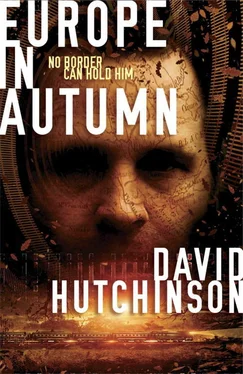IT WAS MID-AFTERNOON before Seth woke up, still tired and headachey, on the bed. Rudi was nowhere to be seen, but his bags – and the custom-built flechette gun – were still there, so Seth had a quick shower, dressed in fresh clothes, and went for a wander.
He found Rudi in the motel’s almost-deserted bar/restaurant, talking quietly on one of the disposable phones and staring at a sausage sandwich as if it had done him an unforgivable wrong. He ordered an Americano and a burger and sat down across from the young Coureur.
“So,” he said when Rudi had finished his call.
Rudi rubbed his face. “Well, Roger Curtis is unusable, I’m afraid. He’s wanted for the murder of your flatmate and his girlfriend.” He shook his head. “Which is actually quite elegant, if you think about it. Someone less sophisticated would have framed you or me.”
“I can get you out,” Seth said.
“I beg your pardon?”
“I might not be all high and mighty and important like you, but I’ve got some contacts. I can get you out. But it won’t be cheap.”
“Nothing worth having ever is.” Rudi shrugged. “I’m sensing an ‘and’ hanging in the air between us.”
“I’m going with you.”
To his credit, Rudi didn’t even try to talk him out of it. He just nodded tiredly. “Yes, well, I’d taken that as a given, rather. Is it my imagination, or is there another ‘and’ here as well?”
“We have to go to Scotland.”
Rudi opened his mouth to say something. Closed it again.
“IT’S ALL ABOUT jurisdiction,” Seth said. “And the Acts of Union.”
Rudi shook his head. “I’ve spent almost a year on the run trying to get out of this fucking country. Why did nobody ever tell me about this?”
“It’s nuance,” Seth told him. “Nitpicking stuff. Body language, really. There probably aren’t more than a dozen people in the whole country who appreciate it properly, and they don’t want the public to know about it because it looks bad.”
They were driving across a rain-lashed landscape of moorland and forest in Northumberland. The B-road they were on was in a terrible state of repair, and the Espace’s suspension kept bottoming out in potholes and ruts in the tarmac. It was half past one in the afternoon, and already the light was taking on a dim, failing, underwater quality.
“Are you trying to tell me,” Rudi said, “that the border isn’t there ?”
Seth sighed. “1603,” he said. “James VI of Scotland becomes James I of England. Most people think that’s when England and Scotland became one country, but actually, although there was one monarch, there were still two Crowns.”
“Because joining two countries together is just as complicated as splitting one up,” Rudi said. He lit a small cigar, opened the driver’s window a crack to let the smoke out.
“It used to be easier,” Seth said. “But that was when kings wore full armour and rode into battle on great fuck-off big horses and all you had to do was kill the other side’s king.” He took a bag from beside his feet, rummaged around in it, and came up with an apple. He took a bite. “Anyway, they actually had three goes at unification. First was under James I. He called himself ‘King of Great Britain,’ and he thought unification was a shoo-in, but the English Parliament was worried that it would mean some of the powers he had as King of Scotland being imposed on England. So. Close, but no cigar.
“Second try was in 1654. Cromwell occupies Scotland during the Civil War, and afterwards he issues an edict creating a Commonwealth of England, Scotland and Ireland. Scotland gets MPs at Westminster. This of course all disappears automatically when Charles II takes to the throne, and the Scottish MPs have to go home. He tries to get unification talks going again in 1669, but it all grinds to a halt.”
“Do children in this country have to memorise this stuff?” Rudi asked.
“This is just background,” Seth replied. “Anyway. 1707. Queen Anne. A Treaty of Unification is ratified. And ever since then the Scots have wanted to leave.”
“Ungrateful bastards.”
“The Scots started to call officially for devolution around the middle of the nineteenth century, I think,” Seth said. He shook his head. “After that it all just gets too fucking complicated. But the point is, when the Separation did take place twenty years ago, it happened in a hurry after a long and fractious history, and there was a lot of bad blood on both sides.”
“And all of a sudden, after a little more than four hundred years, there was a border between the two countries.”
“Well, there was always a border, but most of the time it was just marked with a couple of signs or some farm fencing. You drove back and forth or you got the train or you walked. Nobody stopped you. Half the time you didn’t even realise you’d crossed it. But yes. All of a sudden there was a border. Something that needed defending, patrolling, surveilling.”
“Which costs money.”
Seth grinned. “Oh, it’s much more complicated than that,” he said.
THEY STOPPED AT a bed-and-breakfast place, a farm more or less out in the middle of nowhere. There had been no need to make a reservation; the place was so isolated and the weather was so bad that they were more or less the only vehicle to pass by that day. The owner, a tall, patrician-looking woman with a strong Scots accent, seemed overjoyed to see them and happily booked them into adjoining rooms.
Later that evening – though notionally a bed-and-breakfast, there wasn’t anywhere within an hour’s drive to buy lunch or dinner – they sat in the farm’s little dining room, where Rudi seemed to thoroughly approve of the lamb stew and dumplings on offer, even going so far as to ask the landlady for the recipe.
“Scotland waited too long for independence,” Seth said when the landlady had gone back into another part of the farmhouse to watch television with her husband. “The country was almost broke when the Separation happened, but there was no going back once it had started. There would have been a catastrophe.”
“It was pretty violent anyway, from what I understand,” Rudi said.
“It was in the cities, certainly. But there was no way to stop it. If the government had tried to row back there might have been civil war. It wasn’t a popular government to start with.” He shrugged. “And then, all of a sudden, they’re trying to kickstart an independent nation with the barest of mandates and no money in the Treasury to pay for… well, for anything, pretty much. There was a police force, but no army, navy or air force. The Westminster government was unwilling to provide any help, and the EU wouldn’t bail them out until Scotland became an EU member.”
“Which can take a while.”
“Which can take a while.” Seth drank some of the landlady’s husband’s excellent homebrew and looked around the empty dining room. “Anyway, Holyrood finally made a deal with the Chinese. Which pissed off Westminster and Washington and Brussels and just about everyone else, but really they had no choice. Prestwick Airport is now a Chinese airbase, the Scots got enough money to survive the transition to nationhood, and the Ayrshire Coast is targeted with enough megatonnage to make it glow at night for a million years.”
“And the Anglo-Scottish border is one of the most heavily-defended on Earth.”
“Yes. And no.”
Rudi raised an eyebrow.
“The Scottish Government has been on the edge of bankruptcy for almost the entire time the country’s been independent,” Seth said. “The border’s less than a hundred miles long – call it about a hundred and fifty kilometres, which isn’t very much – but the Scots can’t afford a border defence force. They’ve got a volunteer force of a couple of hundred people, and for most of its length the border runs through country like…” He gestured at the outdoors with his fork. “Wild, horrid country. Even the Romans hated it up here, and they were used to being out in all weathers.”
Читать дальше







